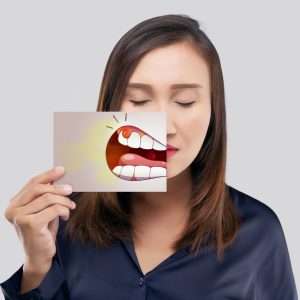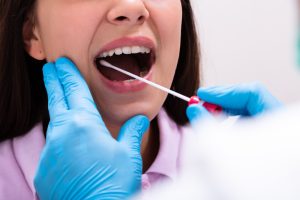Shining a Light on Oral Health: The Importance of Oral Cancer Screenings
Are you concerned about the possibility of oral cancer? Regular screenings can provide peace of mind and early detection, which is crucial for successful treatment. At Polasek Digital Dentistry & Schaefer Dental Group, Howell, MI, dentist Dr. Kyle Polasek and his team prioritize patient well-being by offering comprehensive oral cancer screenings. Learn more about this potentially life-saving, cancer screening service by dialing 517-546-8983.
What is Oral Cavity and Oropharyngeal Cancer?
Oral cavity and oropharyngeal cancers are forms of head and neck cancer that affect the mouth, lips, tongue, gums inner cheeks, and throat. According to the American Cancer Society, approximately 58,000 new oral cancer cases are diagnosed each year in the United States. Early detection through regular oral cancer screening is vital, as these cancers have a higher survival rate when caught in the early stages.
Signs of Oral Cancer
Being aware of the potential signs and symptoms can aid in early detection. These may include:
- Sores or lesions in the mouth or throat that don’t heal
- Lumps or thickened areas in the oral cavity
- Persistent hoarseness or difficulty swallowing
- Unexplained bleeding or numbness in the mouth or throat
Risk Factors For Oral Cancer
Tobacco Use
Smoking cigarettes, cigars, or pipes, as well as using chewing tobacco or snuff, exposes the oral tissues to harmful chemicals and carcinogens present in tobacco smoke or tobacco products we chew. These substances can damage DNA in cells, leading to the formation of abnormal cells that may lead to cancerous growth.
Excessive Alcohol Consumption
Regular heavy drinking or binge drinking can irritate the oral tissues, making them more vulnerable to carcinogenic substances present in tobacco. Alcohol can also act as a solvent, facilitating the entry of these harmful substances into cells, thereby increasing the risk of mouth cancer development.
Prolonged Sun Exposure
Prolonged exposure to ultraviolet (UV) radiation from the sun, particularly on the lips, can damage the DNA in lip cells, leading to mutations that may result in the development of lip cancer.
Human Papillomavirus (HPV) Infection
Certain strains of human papillomavirus (HPV), especially HPV-16 and HPV-18, have been identified as significant risk factors for oral cancer. HPV can cause changes in the infected cells that make them more prone to becoming cancerous.
Poor Oral Hygiene
Inadequate oral hygiene practices, such as infrequent brushing and flossing, can lead to the accumulation of bacteria and other pathogens in the mouth. Chronic inflammation and irritation from poor oral hygiene may contribute to the development of oral cancer over time.
Diet Low in Fruits and Vegetables
A diet lacking fresh fruits and vegetables deprives the body of essential vitamins, minerals, and antioxidants that play a crucial role in maintaining cellular health and repairing DNA damage. This deficiency may lead to a higher risk of oral cancer.
Family History of Oral Cancer
Genetic predisposition or familial patterns of oral cancer suggest a possible hereditary component to the disease. Certain genetic variations may increase an individual’s susceptibility to developing oral cancer when exposed to other oral cancer risk factors.
Previous Head and Neck Cancer Diagnosis
A history of cancers in the head and neck region indicates a heightened risk of developing subsequent oral and throat cancers. Factors such as genetic predisposition and shared environmental exposures may contribute to this increased risk.
Chronic Irritation from Ill-Fitting Dentures
Poorly fitting dentures can cause chronic irritation and inflammation of the oral tissues. Prolonged irritation and tissue damage may increase the risk of oral cancer development at the sites of irritation.
Weakened Immune System
Immunocompromised conditions weaken the body’s ability to identify and eliminate abnormal cells, including those with cancerous potential. Individuals with weakened immune systems are therefore at a higher risk of developing oral cancer.
Male Gender
Men are statistically more likely to develop oral cancer compared to women, which may be attributed to differences in hormonal profiles, lifestyle factors, and occupational exposures.
Age
The risk of mouth cancer increases with age due to cumulative exposure to risk factors such as tobacco and alcohol, as well as age-related changes in cell function and DNA repair mechanisms, making older individuals more susceptible to oral cancer development.
What Are Oral Cancer Screenings?
Oral cancer screenings are essential examinations performed by dental professionals to check for signs of the oral cavity and oropharyngeal cancers. These screenings can detect precancerous or cancerous lesions at an early stage when treatment is most effective. Most dentists and healthcare professionals recommend that everyone have an oral cancer screening at least once a year.
Benefits of Oral Cancer Screenings
Undergoing oral cancer screenings offers numerous benefits for your oral and overall health, some of which include the following:
- Early Detection: Oral cancer screenings can identify abnormalities before they progress, increasing the chances of successful treatment.
- Improved Prognosis: When caught early, oral cancers have a higher survival rate and may require less invasive treatment.
- Peace of Mind: Regular oral cancer screening provides reassurance and can alleviate anxiety about potential health concerns.
- Preventive Education: Oral cancer screenings often involve discussions about risk factors and preventive measures, empowering individuals to make informed lifestyle choices that can reduce their risk of developing oral cancer.
- Comprehensive Health Monitoring: Regular oral cancer screening offers an opportunity for healthcare professionals like Dr. Polasek to monitor overall oral health, including the detection and management of other oral conditions such as gum disease or oral infections.
Common Oral Cancer Screening Methods
- Oral and Tactile Exam: The dentist visually inspects the oral cavity to identify any abnormal areas and palpates (feels) for lumps or abnormalities.
- Light-Based Screening: Special lights and oral cancer screening dye, like toluidine blue dye, may be used to highlight abnormal tissue and make it easier to differentiate from healthy tissue.
- Brush Biopsy: A small sample of cells is collected from the abnormal area and sent for laboratory analysis.
The Oral Cancer Screening Process
Consultation
At your consultation with Dr. Polasek, he will discuss your medical history, lifestyle, and any concerns you have about your oral health. This helps him understand your individual needs and risk factors for oropharyngeal cancers.
Preparation
You usually don’t need to prepare anything special for an oral cancer first screening test. However, Dr. Polasek may give you specific instructions based on your medical history or recent oral health issues to make sure the screening is as effective as possible.
Oral Cancer Screening
During the oral cancer screening, Dr. Polasek will carefully examine your mouth, tongue, gums, and throat. He will look closely at these areas and feel them to check for any abnormal or suspicious areas. He may also use special lights or oral cancer screening dye to get a better view of your mouth, throat, and potential problem areas.
Further Testing
If Dr. Polasek finds anything suspicious during the oral cancer screening, he may recommend additional tests. These could include taking a small sample of tissue (a biopsy) to be checked in a lab or referring you to a specialist for further testing and evaluation. These extra steps help catch and address any potentially malignant disorders as early as possible.
Frequently Asked Questions
Most dental professionals recommend annual oral cancer screenings for adults, especially those with risk factors such as tobacco or alcohol use, HPV infection, or a family history of oral cancer.
Most dental insurance plans typically cover oral cancer screenings. However, the extent of coverage may vary depending on the specific plan and the insurance provider. It’s advisable to check with your insurance company regarding your coverage for oral cancer screenings.
Oral cancer screenings are highly effective when performed by trained professionals, but like any other screening tests, they are not 100 percent accurate. If any suspicious areas are found, your dentist may recommend further diagnostic tests or a biopsy for a definitive diagnosis.
No, oral cancer screenings are non-invasive and typically cause no discomfort. If you experience discomfort, inform your dentist immediately. Discomfort during a routine oral cancer screening may indicate a problem your dentist can diagnose and treat.
Prioritize Your Health: Schedule Your Oral Cancer Screening Today
Early detection of oral cancers can save lives. If you live in Howell, MI, or the surrounding areas such as Pinckney, Wilmington, Fenton, and Milford, don’t delay in scheduling your oral cancer screening. Contact Polasek Digital Dentistry & Schaefer Dental Group at 517-546-8983 and take a proactive step toward your long-term health and well-being. Remember, your peace of mind is invaluable, and your smile and overall health deserve the best care.





